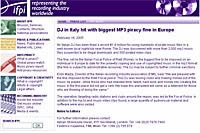 Even the most die-hard Mac hugger is having problems defending the company’s recent litigious spree, where Apple seems determined to become ‘The Man’ and use its corporate power to crush all before it.
Even the most die-hard Mac hugger is having problems defending the company’s recent litigious spree, where Apple seems determined to become ‘The Man’ and use its corporate power to crush all before it.
We find this action particularly strange given the inevitable rise of competition in the portable digital media space. As we’ve saw at CeBIT, the Chinese and Taiwanese MP3-player producing companies have embraced design to good effect. Apple’s iPod crown for the future is now a lot less certain, and given this we’d have thought this would be a time they would be trying to maintain their current friends and make new ones. Instead they appear hell bent on irritating everyone.
First off, there was the case of the bloggers at Apple Insider, PowerPage and Think Secret, mercilessly pursued though the courts after they leaked snippets of Apple’s future plans to their excited audience of Mac users.
Wielding their big white shiny Apple Mac stick, the company successfully won a judgement from the Santa Clara County Superior Court forcing the bloggers to admit to their sources.
The court also granted Apple powers to root around the blogger’s e-mail records in their near-religious quest to track down the culprit.
A wave of international protests followed the ruling by Judge Kleinberg that the laws covering the divulging of trade secrets “outweighed considerations of public interest” with the Guardian newspaper arguing “Was Enron’s off-balance sheet funding structure a “trade secret”, for instance?”
Business Week was equally unimpressed: “Apple has the right to use the legal system to help it punish those who have misappropriated its trade secrets, or to identify employees or partners who may have broken confidentiality agreements.
 But going after the Web sites or forcing them to divulge their sources will put the company in the middle of a freedom-of-speech firestorm that will be a costly distraction for management, and could tarnish the Apple brand.”
But going after the Web sites or forcing them to divulge their sources will put the company in the middle of a freedom-of-speech firestorm that will be a costly distraction for management, and could tarnish the Apple brand.”
Not surprisingly, the EFF was also deeply concerned about the ruling:
“We’re disappointed that the trial court ignored the Supreme Court’s requirement that seeking a journalist’s confidential sources be a ‘last resort’ in civil discovery,” said EFF Staff Attorney Kurt Opsahl. “Instead, the court asserts a wholesale exception to the journalist’s privilege when the information is alleged to be a trade secret.”
“This is a broad-brush ruling that threatens journalists of all stripes,” said EFF Legal Director Cindy Cohn.
Writing in The Scotsman, long time Mac user Stewart Kirkpatrick was equally unchuffed, “In California at least, Apple has destroyed journalism by undermining the most vital tool of our trade: the ability to receive information without having to shop the person who told you.”
Meanwhile, Mac was busy flexing its bully boy corporate muscle in the UK, successfully squashing a smaller company holding prior rights on the iTunes.co.uk domain.
The company registered the name in November 2000 – four years before Apple launched its UK service – with the URL redirecting to their music search engine on CyberBritain.
Apple initiated the complaint because it secretly applied for a UK trademark for the name iTunes on October 27 2000. This application was confidential – known only by Apple, its filing agents and Her Majesty’s Patent Office – and was not published in the TradeMarks Journal until December 6 2000.
After being asked to issue a decision on a complaint through its Dispute Resolution Service, UK domain service registry Nominet has decided that the domain should be handed to Apple.
The owner of iTunes.co.uk, Benjamin Cohen, expressed his frustration. “I must admit that we were not expecting this decision by Nominet’s appointed expert. Apple chose to launch the UK brand of ‘itunes’ within the UK with the knowledge that we had owned the name for three years before their US launch and four years before their launch within the UK,” he said.
“We now face two decisions, whether to appeal to Nominet directly or refer the matter to the High Court. Both of these options are expensive and are not necessarily within the means of a small business. However, the recent High Court victory of Phone4U.co.uk against the major retailer, Phones4U – owned by the Caudwell Group – leads me to think that our case may be extremely strong.”
It’s clear that the Apple self-destruct PR offensive isn’t over yet, with The Register reporting the mysterious case of Google’s vanishing Mac OS X-style interface.
Designed as a tribute to all things Mac, a software engineer had replaced the main text navigation bar on the Google home page with a Mac OS X-style dock sporting a row of eight icons zooming and shrinking as the mouse hovered over them.
The coder was clearly so enamoured with Mac that he included a loving poem above the copyright notice on the Google page: “Roses are red. Violets are blue. OS X rocks. Homage to you”. (sickbag please!)
Sadly, it appears that litigious Apple don’t find anything funny these days, and the design promptly vanished off the Web completely with neither Apple nor Google offering any explanation.
It does seems strange that a company that prides itself for ‘thinking differently’ seems to have embarked on a mission to appear as unpleasant, as ruthless and as willing to crush the little fella as its Redmond neighbours.
With a scathing report in The Guardian concluding that Apple is effectively, “asking to be loathed and subverted”, some pundits are wondering why Apple should actively seek to alienate the people who are its fans and customers.
Put simply, such actions don’t make much business sense.
Google’s X Files disappear
Apple is ‘real loser’ in Think Secret battle
How Apple lost its groove
Nominet backs Apple iTunes domain claim
Blogger lawsuit peels Apple’s shine
 Thrill-seeking mobile phone users around the world slapped out US$400 million on pornographic pictures and video in 2004 – an amount that is expected to rise to US$5 billion by 2010, according to a report by research group Strategy Analytics.
Thrill-seeking mobile phone users around the world slapped out US$400 million on pornographic pictures and video in 2004 – an amount that is expected to rise to US$5 billion by 2010, according to a report by research group Strategy Analytics. The US$5 billion forecast for 2010 represents a huge upward shift from Strategy Analytics’ earlier predictions, with the company noting that adult entertainment businesses are aggressively building services and customers appear happy to shell out for them.
The US$5 billion forecast for 2010 represents a huge upward shift from Strategy Analytics’ earlier predictions, with the company noting that adult entertainment businesses are aggressively building services and customers appear happy to shell out for them. Even the most die-hard Mac hugger is having problems defending the company’s recent litigious spree, where Apple seems determined to become ‘The Man’ and use its corporate power to crush all before it.
Even the most die-hard Mac hugger is having problems defending the company’s recent litigious spree, where Apple seems determined to become ‘The Man’ and use its corporate power to crush all before it. But going after the Web sites or forcing them to divulge their sources will put the company in the middle of a freedom-of-speech firestorm that will be a costly distraction for management, and could tarnish the Apple brand.”
But going after the Web sites or forcing them to divulge their sources will put the company in the middle of a freedom-of-speech firestorm that will be a costly distraction for management, and could tarnish the Apple brand.” MP3-player supplier Jens of Sweden and Jonas Birgersson (founder of broadband supplier Bredband2) have reported the Anti-Piracy Agency to the Swedish Data Inspection Board (SDI).
MP3-player supplier Jens of Sweden and Jonas Birgersson (founder of broadband supplier Bredband2) have reported the Anti-Piracy Agency to the Swedish Data Inspection Board (SDI). Bredband2 has already received queries from the police based on the agency’s registrations.
Bredband2 has already received queries from the police based on the agency’s registrations. Besides, we think that terrorizing and persecuting the users is the wrong method. Instead, we should popularise and support all the great Swedish companies that develop unique digital services. Stop the witch-hunt and support the legal alternatives.”
Besides, we think that terrorizing and persecuting the users is the wrong method. Instead, we should popularise and support all the great Swedish companies that develop unique digital services. Stop the witch-hunt and support the legal alternatives.” The Swedish police have prosecuted 136 people for illegal file sharing after complaints from the AP-agency, and the agency has vowed to increase the number.
The Swedish police have prosecuted 136 people for illegal file sharing after complaints from the AP-agency, and the agency has vowed to increase the number. The Advertising Standards Authority (ASA) has dished out a mixed ruling on a complaint about claims made by Bulldog (owned by Cable & Wireless) for its 4Mbps broadband service.
The Advertising Standards Authority (ASA) has dished out a mixed ruling on a complaint about claims made by Bulldog (owned by Cable & Wireless) for its 4Mbps broadband service. Bulldog seems to have become unstuck by the success of their own advertising, with customers instantly clambering for a piece of the ‘ultimate broadband experience’.
Bulldog seems to have become unstuck by the success of their own advertising, with customers instantly clambering for a piece of the ‘ultimate broadband experience’. A US appeals panel has challenged new federal rules which require certain video devices to incorporate technology designed to prevent copying digital television programs and distributing them over the Internet.
A US appeals panel has challenged new federal rules which require certain video devices to incorporate technology designed to prevent copying digital television programs and distributing them over the Internet. Russian prosecutors are considering filing criminal charges against a Web site that offers cheap music downloads, the music industry’s global trade group has said.
Russian prosecutors are considering filing criminal charges against a Web site that offers cheap music downloads, the music industry’s global trade group has said. A 19-year-burglar is now enjoying an eleven month stretch at Her Majesty’s Pleasure after he was photographed burgling a house by the owner’s Webcam.
A 19-year-burglar is now enjoying an eleven month stretch at Her Majesty’s Pleasure after he was photographed burgling a house by the owner’s Webcam. A “well known” Italian DJ could be hit with a record-breaking fine of up to 1.4 million euros ($1.8 million, £968,000) for using thousands of pirate music files in a nightclub near Rome, police said on Wednesday.
A “well known” Italian DJ could be hit with a record-breaking fine of up to 1.4 million euros ($1.8 million, £968,000) for using thousands of pirate music files in a nightclub near Rome, police said on Wednesday. In a litigious pincer movement,
In a litigious pincer movement,  Despite surviving last year’s pre-Christmas BitTorrent blitz, the LokiTorrent site was finally closed down by a Dallas court yesterday.
Despite surviving last year’s pre-Christmas BitTorrent blitz, the LokiTorrent site was finally closed down by a Dallas court yesterday.